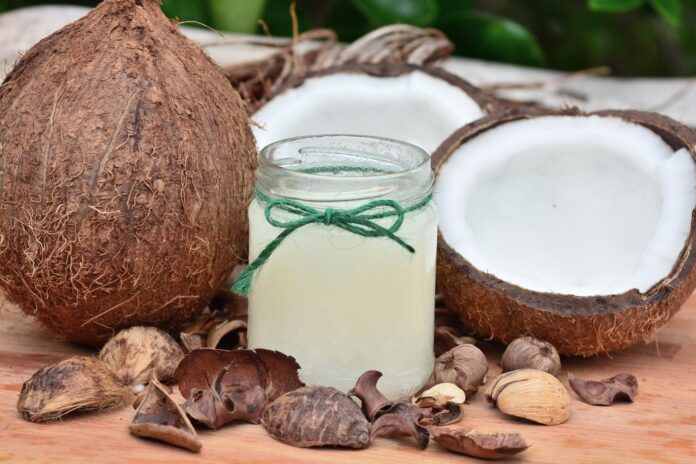A rash is a skin condition that can manifest anywhere on the body, including the face, armpits, and butt. Rash symptoms might include discomfort, itchiness, and the formation of blisters and dry skin in some people.
However, due to its high oil content and high capacity to retain moisture, coconut oil could be beneficial for the skin. It is simple to apply straight to the skin, and there are just a few potential hazards associated with its use.
Coconut oil is being investigated by researchers as a potential topical therapy for patients suffering from persistent skin irritation. However, research on the health advantages of using coconut oil in one’s diet is still in its early stages.
Benefits of coconut oil for the skin
Coconut oil helps to keep the skin hydrated and reduces the appearance of wrinkles and fine lines. Also, protects the skin from the damaging effects of the environment and calms skin that has been inflamed. It is an excellent basis for exfoliants. As a result, you can use it to make your own scrub by combining it with some coarse sea salt or raw sugar. Following are a few benefits of coconut oil for the skin. Let’s check them out.
-
Hydrates
Eczema hinders the skin’s capacity to become and stay moisturized, which can lead to more irritation. According to the findings of one study, improving the skin’s moisture with the topical use of virgin coconut oil helped youngsters whose skin was affected by eczema.
-
Reduces inflammation and pain
In addition to having anti-inflammatory effects, the use of coconut oil may also be helpful in alleviating the discomfort and itching associated with eczema. In research conducted on rats with ear edema, rodents treated with virgin coconut oil had significantly lower levels of fever, inflammation, and discomfort.
-
Reduces bacteria
Coconut oil has a lauric acid that can help lower the number of germs, fungus, and viruses that are present on the skin. Scratching irritated skin, which can lead to infection, is avoided in this way, which helps to reduce the risk of infection. In an abstract that was published in the Journal of the American Oil Chemists’ Society, it was stated that lauric acid had antibacterial qualities. This enables it to be efficient in lowering the number of bacteria, fungi, and viruses. In addition, lauric acid makes coconut oil extremely absorbable, which boosts the oil’s capacity to moisturize the skin.
-
Reduces stubborn acne
Coconut oil is among the best remedies for getting rid of acne that is resistant to other treatments on the buttocks. It does this by reducing the production of sebum, soothing irritation, and killing bacteria that cause infections. Cotton dipped in coconut oil can be used in the affected region to treat the infection. You should do this twice a day in order to calm and ease the affected region, as well as to get a smooth butt. You should not worry about leaving this out overnight because it won’t affect anything.
-
It has anti-microbial properties
Nearly half of the saturated fat in coconut oil is Lauric acid, which is anti-microbial. This acid is very powerful in eliminating fungus, viruses, and bacteria. Oral health can be improved using a technique known as “oil pulling,” in which the substance is used as a mouthwash. This time-honored treatment can help decrease plaque and gingivitis while also eliminating toxins from the body.
Conclusion
The use of coconut oil as a natural therapy for eczema is both safe and effective. Because it possesses antibacterial characteristics, it is capable of eliminating microorganisms that may be present on the skin. In addition to these benefits, it has a high level of moisturizing properties and has the potential to lessen inflammation and pain.



